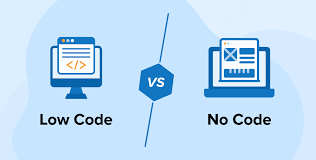In recent years, low-code and no-code platforms have gained significant attention, transforming how businesses and individuals approach app development. These tools allow users to build applications without extensive coding knowledge, making them accessible to a broader range of people. However, while both approaches share a similar goal of simplifying development, they have distinct features and use cases. In this article, we’ll explore the key differences between low code and no code platforms and help you decide when to use each.
What Is Low-Code Development?
Low-code platforms provide a way to build applications with minimal hand-coding. They offer a graphical user interface (GUI) for designing applications, allowing developers to drag and drop components, create workflows, and configure integrations with little manual coding. While low-code platforms still require some technical knowledge, such as understanding programming languages or logic, they significantly reduce the amount of coding needed. These platforms are designed to accelerate development for professional developers, enabling them to build apps faster than traditional methods.
What Is No-Code Development?
No-code platforms take things a step further by eliminating the need for any coding at all. With no-code development, users can create applications through intuitive, visual interfaces with pre-built templates and components. These platforms are primarily aimed at non-technical users, including business analysts, marketers, and entrepreneurs who have no prior experience with programming. No-code tools make app creation simple, offering easy-to-use features that require no coding knowledge, making it a perfect fit for those looking to build solutions quickly and efficiently.
Key Differences Between Low-Code and No-Code
The most apparent difference between low-code and no-code platforms is the level of technical expertise required. Low-code platforms, while designed to minimize coding, still require some level of programming knowledge to fully utilize their capabilities. Users may need to write custom code or configure APIs to connect various systems. In contrast, no-code platforms are built for complete beginners, where users do not need any coding skills. These platforms are highly automated and focus entirely on simplifying app creation through drag-and-drop components, reducing reliance on developers.
Another distinction lies in flexibility. Low-code platforms offer more flexibility for customization since they allow users to integrate custom code, tailor workflows, and build complex applications. No-code platforms, while excellent for simple apps or MVPs (minimum viable products), can sometimes be limiting when it comes to advanced customizations or integrations.
When to Use Low-Code Platforms
Low-code platforms are ideal for businesses that need to create custom applications but do not have the resources or time to invest in extensive coding from scratch. They are particularly useful for professional developers or teams that want to speed up the development process without sacrificing flexibility. For example, enterprise solutions, internal tools, and integrations with complex systems can all benefit from a low-code approach. These platforms allow developers to work more efficiently while still maintaining control over the application’s design and functionality.
Low-code tools are also excellent for applications that require more than just a simple user interface, such as apps with complex business logic or integrations with other software. These platforms give developers the ability to create robust, scalable applications while avoiding much of the repetitive work.
When to Use No-Code Platforms
No-code platforms, on the other hand, are perfect for non-technical users who need to build simple applications quickly. These platforms are particularly useful for small businesses, startups, and individuals who may not have access to development resources. For instance, marketing teams can use no-code tools to create landing pages, build customer portals, or automate workflows without relying on developers.
No-code platforms also work well for creating prototypes or MVPs, allowing entrepreneurs to test their ideas in the market before committing to more extensive development. The simplicity and speed at which no-code platforms allow users to create apps can be invaluable for validating business ideas or developing solutions with tight budgets and timelines.
The Benefits of Each Approach
Both low-code and no-code platforms come with unique benefits. Low-code tools allow for greater customization and flexibility, making them a great option for more advanced projects. They can support complex workflows, integration with other systems, and create applications that scale as businesses grow.
On the other hand, no-code platforms excel in speed and ease of use, enabling non-developers to quickly build functional applications without any prior programming knowledge. This ease of use makes no-code platforms a perfect fit for businesses looking for rapid solutions to everyday problems without the need for developer involvement.
Choosing the Right Approach for Your Needs
Understanding the differences between low-code and no-code platforms is essential to determining which approach is best for your needs. If you’re a developer looking to speed up the process of building custom applications, low-code platforms are likely your best choice. They offer flexibility and the ability to handle more complex projects with ease. Both low-code and no-code platforms are revolutionizing the way we approach app development, making it more accessible than ever before. By understanding the key differences and knowing when to use each, you can select the right tool to meet your development needs and achieve success.

